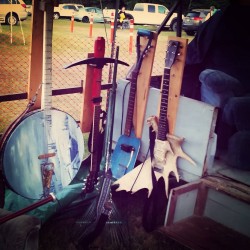Editorial | July 20th, 2016

As clichéd as it is to say that you learn something new everyday, it always seems to hold true, though some things have a lot more intellectual value than others.
This week the High Plains Reader had the privilege of interviewing Mud Morganfield, bluesman and son of blues legend Muddy Waters. We also spoke to Canned Heat drummer Adolfo “Fito” de la Parra, prior to their appearance at the 2016 Fargo Blues Festival.
Both provided unique perspectives on the genre. Morganfield spoke of being the son of a blues legend--with whom he rarely had contact because he was constantly on the road, though he did receive support from his father’s peers.
He spoke of the hardships his father experienced on the road and of the evolution of his genre; and most notably, how his career expanded in England after a new interest in the blues, courtesy of the British Invasion--or more specifically The Rolling Stones.
For inspiration he dipped into his pool of life experiences. In speaking of hard times, he shrugged them off, laughed a warm hearty laugh, and simply replied “that’s where I got my blues.”
As a second generation bluesman, he spoke of his mission to honor his father’s legacy and to keep the Chicago blues alive.
The blues originated upriver from New Orleans in the Mississippi Delta. They climbed their way upriver, spread to urban areas and became electrified once they hit Chicago; and have been evolving into various subgenres ever since.
They stemmed from African chants, spirituals, hymns, field hollers, and various other influences from slaves and sharecroppers in the Deep South.
As a blues rock pioneer, Fito provided a firsthand account of the backstage at Woodstock, and also an account of being a pioneer in the field of blues rock. He spoke of his bandmates’ efforts to seek out forgotten bluesmen, revive their careers, and show them the appreciation they so desperately deserved.
They sought them out, finding some working at trades far removed from their musical roots, playing in empty clubs, or patients in sick houses. Imagine the range of emotion on both sides: one side jaded, thinking their art or their dream was forgotten; the other finding a diamond in the rough, and trying to convince the old bluesman that he is the real deal -- offering him opportunities to play in front of thousands of people, and offering record contracts.
Fito played in various other pop-rock bands in the late 50s and early 60s in Mexico, backed some large names at a club the first year he lived in the States, and then a year later he was headlining Woodstock with Canned Heat.
He said that if you wanted to seek out music in those days it really was a hunt. The radio stations would feed the masses American top 10 hits, though every once in awhile, Wolfman Jack’s show would come over the radio waves late at night. Fito was introduced to the blues through an American girlfriend and he was hooked.
The 60s were a turbulent time politically, and what better way to speak to a generation than through the universal language of the blues? Maybe we could learn something from their blues.
Can we channel our turmoil through art and music? Can we turn our blues into something productive rather than something destructive and violent? Dear readers, consider this a challenge.
Morganfield’s parting words were, “If I don’t share it--what’s the sense in keeping it? If I don’t share some of my experiences and some of myself, it just goes away with me and I want people to know that.”
February 16th 2026
January 15th 2026
December 18th 2025
November 18th 2025
October 15th 2025
_(1)__293px-wide.png)


_(1)__293px-wide.jpg)

